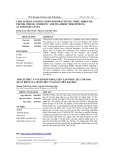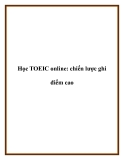
Practice Test 1
creation noun / kri 'eɪʆən / [uncountable] the act of creating something
•creation of
The plan should result in the creation of 2000 new jobs.
the creation of a single European currency
creativity noun / kriːeɪ 'tɪvəti / [uncountable] the ability to use your imagination to produce new
ideas, make things etc
artistic creativity
They have little opportunity to use judgment or creativity.
advantage noun / əd 'vɑːntɪdʒ/
1. [uncountable and countable] something that helps you to be more successful than others, or the
state of having this ᅳ opposite disadvantage
•advantage over
Her experience meant that she had a big advantage over her opponent.
His height gives him an advantage over the other players.
Western countries enjoyed considerable advantages in terms of technology.
Younger workers tend to be at an advantage when applying for jobs.
•advantage of
One of the many advantages of living in New York is that you can eat out at almost any time
of day.
The hotel is not very modern, but it does have the advantage of being close to the city
centre.
2. take advantage of somebody to treat someone unfairly in order to get what you want,
especially someone who is generous or easily persuaded
Don't lend them the car - they're taking advantage of you!
3. take advantage of something (to do something) to use a particular situation to do or get
what you want
I took advantage of the good weather to paint the shed.
You'll want to take full advantage of the beachfront clubs.
at the top (of) something
He was standing at the top of the stairs.
Write your name at the top of the page.
1

on top of something on the highest surface of something
There should be an envelope on top of the fridge.
external adjective / ɪk 'stɜːnl / relating to the outside of something or of a person's body
ᅳ opposite internal
the external appearance of the building
For external use only (=written on medicines which must be put on your skin and not
swallowed)
exterior noun / ɪk 'stɪəriə / [countable] the outside of something, especially a building
ᅳ opposite interior
•exterior of
the exterior of the factory
The dome is tiled on the exterior.
renew verb / rɪ'njuː/ [transitive] to arrange for an agreement or official document to continue for a
further period of time
•renew somebody's contract/licence/membership etc
I need to renew my passport this year.
reform verb / rɪ'fɔːm / [transitive] to improve a system, law, organization etc by making a lot of
changes to it, so that it operates in a fairer or more effective way
plans to radically reform the tax system
level noun / 'levəl / [countable] the amount or degree of something, compared to another amount
•level of
•high/low level
•price/income/salary etc levels
Increased supplies are needed to meet the level of demand.
Dolphins show a high level of intelligence.
Inflation dropped to its lowest level in 30 years.
At the moment, public interest is at a high level.
the high salary levels of top executives
2

basis noun / 'beɪsɪs / [countable] the facts, ideas, or things from which something can be
developed
•basis of something
•basis for something
Bread forms the basis of their daily diet.
The video will provide a basis for class discussion.
•on the basis of something : because of a particular fact or situation
discrimination on the basis of sex
•on a regular/daily/weekly etc basis every day, week etc
I'm saving money on a regular basis.
•on a voluntary/part-time/temporary etc basis a system or agreement by which someone
or something is voluntary etc
Nurses are employed on a full-time basis.
make out phrasal verb
1. make something ↔ out to understand something, especially the reason why something has
happened
•make out what/how/why etc
I couldn't make out what I had done to annoy her.
2. make somebody ↔ out to understand someone's character and the way they behave
Stuart's a strange guy - I can't make him out at all.
make up phrasal verb
1. to combine together to form something ᅳ synonym constitute
•make up something
•be made up of something
Women make up only a small proportion of the prison population.
The committee is made up of representatives from every state.
2. to produce a new story, song, game etc by thinking
3

Nick made up a song about them.
When you're the boss you can make up your own rules.
3. to put make-up (=special coloured substances) on someone's face in order to make them look
better or different
They made him up as an old man for the last act of the play.
after [preposition/adverb/conjunction] after something happens or after someone does something
We went for a walk after lunch.
Gingrich won election to the House in 1978, after Flynt retired.
What did you do after leaving school?
•an hour/two days/a year etc after
My father died two days after I was born.
•just after/ right after /soon after/not long after
My sister and her husband moved west just after their wedding.
Paul rushed home right after school.
afterwards [adverb] after an event or a time that you have just mentioned
•two years/three months etc afterwards
•soon/shortly afterwards
The operation was rather painful, but I felt a lot better afterwards.
A couple of years afterwards I bumped into her in a supermarket.
His wife fell ill in June and died soon afterwards.
next /nekst/ [adverb] after something happens or after someone does something -- use this when
you are describing a series of events in the order they happened
Can you remember what happened next?
later [adverb] some time after now or after the time you are talking about
•three months/two years/ten days etc later
•later on
•much later (=a long time later)
•later that day/month/year etc
A couple of days later I saw her in a downtown bar.
The first part of the film is really boring but it gets better later on.
I found out much later that some of the children I taught had become teachers themselves.
Later that month we got another letter from them asking for more money.
then [adverb] after you have done something -- use this when you are describing a series of things
you did, or when you are giving instructions
4

First we played tennis, and then we went swimming.
subsequently [adverb] formal after an event was finished in the past
The book was published in 1954 and was subsequently translated into fifteen languages.
The six men were subsequently acquitted of all charges, but only after they had served 17
years in prison.
confidential adjective / kɒnfɪ╹denʆl/ spoken or written in secret and intended to be kept secret
a confidential government report
Doctors are required to keep patients' records completely confidential.
The information will be regarded as strictly confidential (=completely confidential).
implement verb / 'ɪmplɪment / [transitive] to take action or make changes that you have officially
decided should happen
•implement a policy/plan/decision etc
We have decided to implement the committee's recommendations in full.
sighting noun /'saɪtŋɪ / [countable] an occasion on which something is seen, especially
something rare or something that people are hoping to see
•sighting of
There were two unconfirmed sightings of UFOs in the area.
expel verb / ɪk'spel /
1. to officially force someone to leave a school or organization
•expel somebody from something
•expel somebody for doing something
Two girls were expelled from school for taking drugs.
The main opposition leader was expelled from her party.
He was expelled for making racist remarks.
2. to force a foreigner to leave a country, especially because they have broken the law or for political
reasons
•expel somebody from something
•expel somebody for something
Foreign priests were expelled from the country.
Three diplomats were expelled for spying.
repel verb / rɪ'pel / [transitive] to keep something or someone away from you
a lotion that repels mosquitoes
5













![Tài liệu luyện thi TOEIC cấp tốc trong 10 ngày [chuẩn nhất]](https://cdn.tailieu.vn/images/document/thumbnail/2025/20251029/kimphuong1001/135x160/99661761725822.jpg)
![Tài liệu Phá đảo TOEIC 900+ từ mất gốc trong 30 ngày [Mới nhất]](https://cdn.tailieu.vn/images/document/thumbnail/2025/20251029/kimphuong1001/135x160/2101761720956.jpg)











